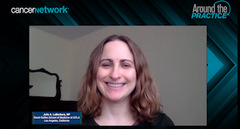
Treatment Strategies for HER2+ Breast Cancer and Brain Metastases
Treatment recommendations for patients with HER2-positive metastatic breast cancer, like Erika Rich, upon identification of lesions in the brain.
Episodes in this series

Sara A. Hurvitz, MD: We’re going to turn to our second segment, which is going to be about the rest of your journey, because this was just the beginning. Erika was diagnosed at the age of 25 with a 3.2-cm right breast mass that is ER [estrogen receptor] and PR [progesterone receptor] negative and HER2 [human epidermal growth factor receptor 2]–positive. PET [positron emission tomography] CT showed de novo metastases in the lymph nodes, liver, and bones. She was treated with 6 rounds of THP [docetaxel, trastuzumab, pertuzumab] in the front line with radiation to the painful hip lesions. She did well and had no evidence of disease in August 2019. Then she was continued on maintenance HP [trastuzumab, pertuzumab], following the guidelines in the CLEOPATRA trial.
Things went well, but a few months after having a good scan result, Erika developed progression in the right breast with redness and firmness of the breast. There were multiple lesions. Scans ended up showing that she had multiple brain metastases at this time of progression with over 20 supra and infratentorial metastatic lesions in the brain. She was ultimately placed on trastuzumab emtansine, or T-DM1, and underwent whole-brain radiation. A lot happened to you quickly after having your disease was well controlled. Can you tell us if you were having symptoms in the brain at the time? Headaches, vision changes, nausea—anything that would indicate this was going on. Or was the brain scan done as a part of reevaluating you when you had these new breast lesions show up?
Erika Rich: My doctor suggested it after he caught it from the neck down. He saw something at the bottom of my neck on the CT and asked to do an MRI. I didn’t notice any symptoms like nausea, but when it came to my mental state of being—from when I was told that I had no evidence of disease until I was biopsied again—I was more depressed than I had ever been. I was very confused about what to do now that the cancer is suddenly gone. I went through this crazy journey. I looked different. I tried to move back to Nashville [Tennessee] to get back into real estate and the other jobs I was doing beforehand, but nothing felt right. When they told me I had cancer in my brain, I was shocked because I hadn’t had any headaches or symptoms like that. But I wasn’t surprised because mentally I had been in the worst state in my entire life.
It was kind of a relief. I was like, “Maybe that’s why that was happening.” But whenever they called and told me it was a complete shock. It was probably the most scared that I had ever been with my cancer diagnosis. When they initially called, they asked if I was having any symptoms. I was like, “No, why?” They were like, “This is how you presented in your scans.” A few days later, when they called to reschedule me for targeted therapy, they said we need to schedule you for total brain radiation. I was like, “Why? What do you mean?” They told me I had about 18- to 20-cm lesions all over my brain. I had never heard of anyone experiencing those kind of brain metastases, so I thought that that was the end for me. Whatever it was that they suggested as the cure, I thought that that was going to be my last Christmas with my family, my last everything. I went into that mindset, which made for an interesting Christmas because they did my radiation and also put me on a high dose of steroids. It was an eventful time of my life.
Sara A. Hurvitz, MD: It sounds devastating emotionally from a patient’s perspective to receive a diagnosis like this. From my own experience, it sounds like a very typical and understandable reaction that you had. Julia, can you talk to us about the top questions patients have about brain metastases? What things do they typically ask? What do they forget to ask?
Julia LaBarbera, NP: It’s important for patients to understand that this is still the same disease. When patients hear that there’s cancer in the brain, they think, “I have brain cancer.” But it’s important to reiterate that this is breast cancer that has spread to the brain. Their first questions are, “What does this mean for my overall prognosis? Am I going to die sooner? Is this treatable? What does the treatment look like?” There’s a sense of bewilderment: how does this change where we go from here? I’m not present for the discussion with the radiation oncologist. From the discussions I have with patients, they forget to ask what the adverse effects are related to this type of treatment. Are there long-term adverse effects that I need to be aware of? When you’re dealing with metastatic cancer, you’re like, “What do I need to do next? You’re not necessarily thinking that you could live for several years with cancer in the brain or how will this impact me long term? Maybe we need to do a better job as clinicians to address that over time.
Sara A. Hurvitz, MD: Absolutely. Patients ask questions that Erika was alluding to. Does this mean I’m dying right now? Our statistics give us an idea of median survival after brain metastases, but those are statistics that are based on patients from multiple years ago with different treatment options available. I always remind patients, “The median overall survival of a patient diagnosed with brain metastases today is different and probably better based on the advances that we have for local therapy and even systemic therapy.” It’s important to address having hope.
Transcript edited for clarity.
Newsletter
Stay up to date on recent advances in the multidisciplinary approach to cancer.





































